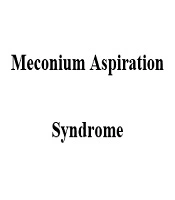Dear editor,
Meconium aspiration syndrome (MAS) is a leading cause of neonatal morbidity and mortality. MAS is defined as respiratory distress in the first four hours after birth in the presence of meconium-stained amniotic fluid (MSAF) (1). MAS is categorized as moderate (requiring oxygen therapy with a fraction of inspired oxygen (FIO2) of 40% or greater for at least 24 h) or severe (requiring assisted mechanical ventilation) (2). MAS can lead to the development of pulmonary injuries by a different mechanism (3). MSAF may contribute to multiple long-term and short-term adverse outcomes, including increased risk of neonatal resuscitation, low Apgar score, respiratory distress, pulmonary diseases, and neonatal sepsis. Globally, the incidence of MAS is reported to be 5% - 10% in infants, which accounts for an estimated 12% of all neonatal deaths (4). Over the past several years, there have been tremendous advancements in the treatment of MAS. The Neonatal Resuscitation program (NRP) has found widespread acceptance globally as a practical tool to improve newborn survival and reduce the risk and complications of MAS (5). The global implementation of NRP began on January 2, 2016 (6), aiming at providing the cognitive, technical, and behavioral skills needed to successfully resuscitate neonates after delivery (7). This study was conducted at two primary and secondary teaching hospitals in Ilam city, Iran, using a cross-sectional design during 2015 - 2017. A purposive sample of 57 neonates with MAS was recruited for the study. Non-vigorous newborns were included in this study through MSAF. Excluded neonates were those with insufficient information in medical records, intrauterine death, out-of-hospital birth, congenital heart disease, congenital anomalies, maternal disease during pregnancy, and complications during birth. The participants were divided into two groups conveniently. Groups I and II received usual care (n = 24) and NRP protocol (n = 33), respectively. There were significant differences in the length of hospital stay, Apgar score, days on mechanical ventilation, rate of neonatal mortality, and amniotic fluid concentration (P < 0.05). Those who received the NRP protocol had a shorter hospital stay, lower Apgar score, shorter duration of mechanical ventilation, lower rate of mortality, and decreased amniotic fluid concentration than those who received usual care. This pilot study showed promising results on the effectiveness of the NRP protocol. To date, very few studies have been conducted on this topic. Future randomized controlled trials with larger sample sizes and longer follow-up periods are needed to provide more precise evidence.
